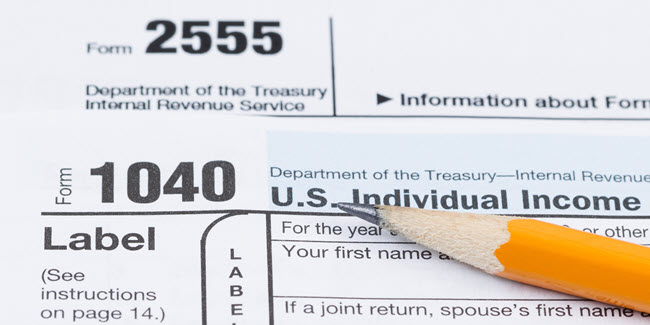What U.S. Expats Need to Know About The Foreign Earned Income Exclusion (FEIE)
7 min read
March 04, 2024
March 04, 2024
At a glance
Learn more about the Foreign Earned Income Exclusion with this tax guide from the Expat tax experts at H&R Block. Find out if you qualify for an exclusion on your expat taxes.

The Foreign Earned Income Exclusion (FEIE) is one of the most common tax benefits U.S. expats have access to. If you’re eligible, it allows you to to exclude all or a portion of your foreign earned income from their United States taxes.
But before you jump to claim the FEIE, there are a few things you should know:
- If used properly, the FEIE can save you thousands of dollars on your United States taxes
- It’s not a blanket foreign income exclusion — there are stipulations on what you can exclude and what you can’t
- You don’t automatically get the FEIE — you need to meet specific qualifications and then file the proper paperwork (Form 2555)
- The FEIE isn’t your only tax relief option — you should ask your Tax Advisor what options are available to you based on your specific situation.
U.S. taxes for expats aren’t easy. Let our experienced Expat Tax Advisors help prepare your tax return this year to ensure the foreign earned income tax exclusion is elected when it is most beneficial to you. Ready to claim the FEIE? We’ve got a tax solution for you — whether you want to DIY your expat taxes or leave it to one of our experienced Tax Advisors. Head on over to our Ways to File page to choose your journey and get started.
What foreign income can you exclude with the FEIE?
The Foreign Earned Income Exclusion can help reduce or eliminate U.S. taxes on foreign income earned while working abroad, but it doesn’t apply to all sources of income.
This exclusion is only available for earned income and doesn’t apply to passive or investment income such as interest and dividends. Foreign earned income includes:
- Salary
- Wages
- Bonuses
- Commissions
- Self-employment income
All income must have been earned in a foreign country to count as foreign earned income.
Note: You might qualify for the foreign earned income exclusion even if the country in which you’re working doesn’t assess income tax on compensation, like the UAE.
Who qualifies for the Foreign Earned Income Exclusion?
The foreign income tax exclusion applies to those who have lived abroad for a certain period of time within the tax year. However, partial-year exclusions are available if you’ve recently moved to a foreign country or returned to the U.S. mid-year.
The FEIE is available to expats who either:
- Work outside the U.S. as employees, whether for a U.S. or non-U.S. employer
- Work outside the U.S in a self-employed or partner capacity
- Pass either the Bona Fide Residence Test or the Physical Presence Test
Employees of the U.S. government can’t claim the foreign income exclusion. However, an employee of a private company under contract with the U.S. government might still be eligible.
Passing the Bona Fide Residence Test
To qualify as a Bona Fide Resident and pass the test, you must prove that you have more ties to a foreign country than the U.S. You also must be a resident of that country for an uninterrupted period that includes an entire tax year. When and if you go back to the U.S., you must have the intention of returning to your current foreign country of residence. In addition, you must:
- Be a U.S. citizen or be a resident alien of a foreign country with which the U.S. has an income tax treaty.
- Earn active income. Unearned, or inactive, income like pension payouts, interest, and dividends cannot be included.
- Be overseas for work for a period longer than a year.
- Have a permanent place of work in a foreign country.
It is possible to be a Bona Fide Resident for part of the year if you spent at least a full tax year outside the U.S. in a prior year. As a result, you can claim the FEIE for part of the year.
Passing the Physical Presence Test
To qualify under the Physical Presence Test, you must have been living outside the U.S. for 330 full days out of the year. Be careful when you track your time, because a “full day” counts as 24 hours starting at midnight, and you need to be in-country for every minute of those 24 hours.
For example, if you lived in Windsor, Canada and popped over the border to Detroit for Friday night and came back Saturday evening, you wouldn’t be able to count that time towards your 330 full days.
How much foreign income can I exclude?
If you’re an expat and you qualify for a Foreign Earned Income Exclusion from your U.S. taxes, you can exclude up to $112,000 or even more if you incurred housing costs in 2022. (Exclusion is adjusted annually for inflation). For your 2023 tax filing, the maximum exclusion is $120,000 of foreign earned income. If you’re married and both of you meet either the bona fide residency test or the physical presence test, you can each claim the FEIE.
Foreign Tax Credit vs. Foreign Earned Income Exclusion
It’s important to choose between the foreign income exclusion vs. foreign tax credit wisely. If you claim the exclusion and then change back to the foreign tax credit, you can’t claim the exclusion again for five years. The only way to claim the exclusion again involves a costly process with the Internal Revenue Service (IRS). Get tax help from an expat tax advisor to help you understand your options.
Claiming the foreign tax credit and filing Form 1116 might be the better option if any of these apply:
- You’re paying foreign tax at a higher rate than your U.S. tax rate
- You wish to participate in an individual retirement arrangement (IRA)
- You qualify for certain family-related credits based on non-excluded income
- You wish to exclude or reduce taxes on passive or investment income
Foreign Earned Income Exclusion extensions
Even if you haven’t been out of the country long enough to claim the exclusion by your expat filing deadline, you can request an extension to file until you’ve met these time requirements.
You generally must claim the exclusion either:
- Within one year of the due date of your tax return
- By amending a timely filed return
However, you may claim the exclusion if:
- The IRS hasn’t discovered your failure to file your return claiming the exclusion, or
- You owe no tax after taking the exclusion into account
If you haven’t filed returns in prior years, you still might be able to exclude your foreign earned income from U.S. tax. This could have the effect of eliminating your tax liability and any penalties and interest that would be assessed.
Foreign Housing Exclusion and Foreign Housing Deduction
If you’re an expat and you incur foreign housing expenses, you might be able to exclude or deduct them. The Foreign Housing Exclusion is available for expats working as employees with housing expenses like rent and utilities.
The foreign housing deduction is available for self-employed expats paying foreign housing expenses. The amount of your housing exclusion or deduction is based on the difference between the following:
- Your actual foreign housing expenses
- A base amount for your foreign country of residence
You can use the Foreign Housing Exclusion if your housing costs total more than 16% of that year’s FEIE.
To calculate the maximum amount you can exclude, you’d multiply that year’s maximum income exclusion by 0.3 to get 30% of the full exclusion amount. So, for 2023, you’d take $120,000 x 0.3 = $36,000. Something to know is that most large metro areas have higher limits, so it’s important to have a Tax Advisor who knows the ins and outs of taxes in your specific area.
Common problems U.S. expats have with the foreign income exclusion and Form 2555
U.S. expats have a lot of the same questions and issues when they file their FEIE, but these are the most common problems associated with the FEIE:
- You didn’t file Form 2555 – Many expats assume that if they qualify for the FEIE it will be automatically added to their tax filing. To claim the FEIE you must file Form 2555.
- You’re a government employee — Unfortunately, U.S. government employees cannot claim this foreign income exclusion.
- You failed to calculate the FEIE correctly – If you calculate your FEIE incorrectly you won’t get the correct amount excluded.
- You claimed the FEIE when you should have claimed the FTC – For example, if you’re retired abroad and you only have investment and passive income, you may have been better off claiming the FTC.
- You didn’t track your time properly – You must be vigilant about tracking your time if you want to pass the Bona Fide Residency or Physical Presence tests. Even being off by a few hours can mess up your qualifications.
- You had no active income for that year – If you’re living abroad off investment or passive income, you don’t qualify for the FEIE.
- You didn’t pay your U.S. self-employment taxes – You still have to pay self-employment taxes when you’re claiming the FEIE.
These are only a few of the most common issues and problems we come across. If you’re having difficulties or are a new American expat, it’s smart to leave your expat taxes to a specialist.
File your Foreign Earned Income Exclusion with H&R Block
Filing taxes while living and working abroad can be overwhelming and stressful. As an expat, your tax situation is very different and requires specialized expertise. Get started with H&R Block’s Expat Tax Services today.
Was this article helpful?
Recommended articles
See what expats have to say about their experience with us.

No one offers more ways to get tax help than H&R Block.
Easy online filing designed for expats. Experienced experts if you need them. Get your taxes done in the way that’s right
for you.









